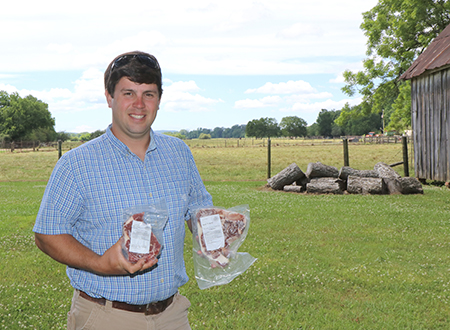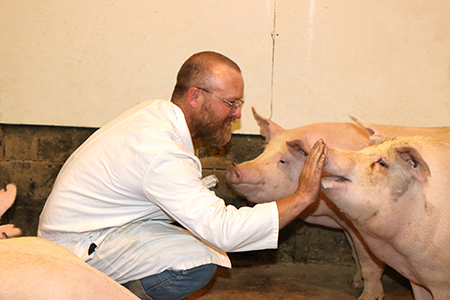Here’s The Beef: Processing Shortage Stymies Opportunities For Cattlemen And Pork Producers

American consumers witnessed kinks in the nation’s food supply chain during the COVID-19 pandemic, sending shoppers in search of locally grown food.
The increased interest became a blessing for many fruit and vegetable growers who enjoyed an influx of local patrons. Sales increased at farmers markets and roadside stands. On-farm sales also spiked.

But some Alabama cattlemen may view the pandemic as a missed opportunity due to a shortage of state and federally inspected meat processing facilities.
“Selling meat directly to consumers can be a profitable alternate marketing avenue for producers,” said the Alabama Farmers Federation’s Brady Ragland. “There are additional expenses and risks involved in feeding and caring for an animal until it’s harvested, but for producers who can do it successfully, there is a potential of increasing profits by $500 or more per head.”
Unlike fruit and vegetables, meat requires further processing, said Ragland, the Federation’s Beef Division director. That’s the biggest obstacle cattle and hog farmers experienced while trying to capitalize on increased demand.
“I sell 15-20 calves a month and about 20-30 hogs a month for freezer meat,” said Lowndes County farmer David Lee, 45. “If more processing was available, I could sell more. Currently, I have to travel throughout the state to different processors to get that much meat done. Fortunately, my customer base is scattered across the state.”
Lee sells Trinity Farms beef in several ways but mostly to customers who buy a whole mature calf or purchase a half side of beef and share with family or friends.
Lee partners with Walker County hog farmer Daniel Tubbs to provide pork for customers. Tubbs chairs the Federation’s State Pork Committee and farms with his father and two brothers. The family also raises beef cattle.
“I owe a lot to David Lee for including me in his farm-to-fork business,” said Tubbs, 36, who also provides pork directly to his own customer base. “My family has been raising hogs for over 45 years, but we’re fairly new to this direct-marketing business. We buy feeder pigs that weigh 60-90 pounds and feed them until they weigh 280-300 pounds. That usually takes three to five months. Our pork is fresh and delicious, and we have a lot of repeat customers.”
Like others, Tubbs faces a shortage of processing, forcing him to travel at least two hours to the closest processor.
“There’s definitely been an increase in demand for locally grown meat since the pandemic hit,” Tubbs said. “Prior to that, in five years, I maybe only had five calls a year from people about buying pork. Since the pandemic, I’ve had 10 or more calls a week wanting to buy pork. It’s frustrating as a producer to have a product people want and not be able to get it to them.”
As the food supply chain returns to normal operations (the USDA reports major meat processors were at 95% capacity in early July following earlier closures due to COVID-19). Tubbs predicts demand for local meat may diminish but won’t disappear. He recalls a time when local meat processors were common in rural Alabama.
“As society became more urban and people moved away from the farm, the demand for local processing dwindled,” he said. “Plus, there are a lot of government regulations in operating a facility. There is also an issue of finding and keeping good employees and the expense of operating a business that handles large animals, which requires large amounts of freezer space.”
There are three classifications for processing facilities in Alabama; custom exempt, federally inspected and state inspected.
Custom exempt facilities can only process livestock owned by an individual, and the meat cannot be resold. Those facilities are inspected for USDA sanitary requirements. Packaged meat is stamped “not for resale.”
State and federally inspected facilities in Alabama have USDA inspectors on site. Meat processed at federally inspected facilities can be sold in state and across state lines, while state inspected meat can only be sold within state boundaries.
The processing shortage for locally grown meat extends beyond Alabama. Reports indicate similar problems in almost every state.
USDA reports nearly 40% of privately owned livestock harvest facilities (about 1,800) closed from 1990—2016. Big meatpacking facilities (Tyson, Cargill, JBS and National Beef) now process more than 80% of the beef in the U.S.
Processing in Alabama is in such demand that many facilities are booked full through the end of the year. Likewise, some farmers are turning customers away.
Bibb County Farmers Federation President Ashton Cottingham already has a waitlist of consumers wanting homegrown beef. He and his father, Steve, own River City Cattle Co. and raise 150 calves annually in Centreville. Most of their calves are in sold trailer-load lots after they reach 700 to 800 pounds. But they also sell about 15 calves annually for freezer beef. Ashton plans to increase that number to 24 next year if he can secure processing.
“I sell all the freezer beef I raise without ever advertising,” Ashton said, “So I know there is a demand for local, farm-raised beef. I take most of my calves to a processor in Mississippi because it’s a large facility. But even that business is backed up for months right now.”
Back in Lowndes County, Lee said he would like Alabama to offer incentives provided by other states, such as Tennessee, Mississippi and Kentucky, to encourage processing expansions or new construction. Ragland said Federation leaders are working with partners and state agencies to address the processing shortage.
Two bills designed to provide consumers greater access to beef, pork and poultry products were introduced by U.S. lawmakers. If passed, it could provide grants for custom meatpackers to qualify for federal inspection and sell products across state lines.
Increased demand for locally grown products has highlighted the state’s agricultural branding program.
Sweet Grown Alabama includes a searchable database of members at SweetGrownAlabama.org. There are 26 beef producers and 13 pork producers, in addition to farmers with fruit, vegetables, ornamental plants and other Alabama-grown products.
